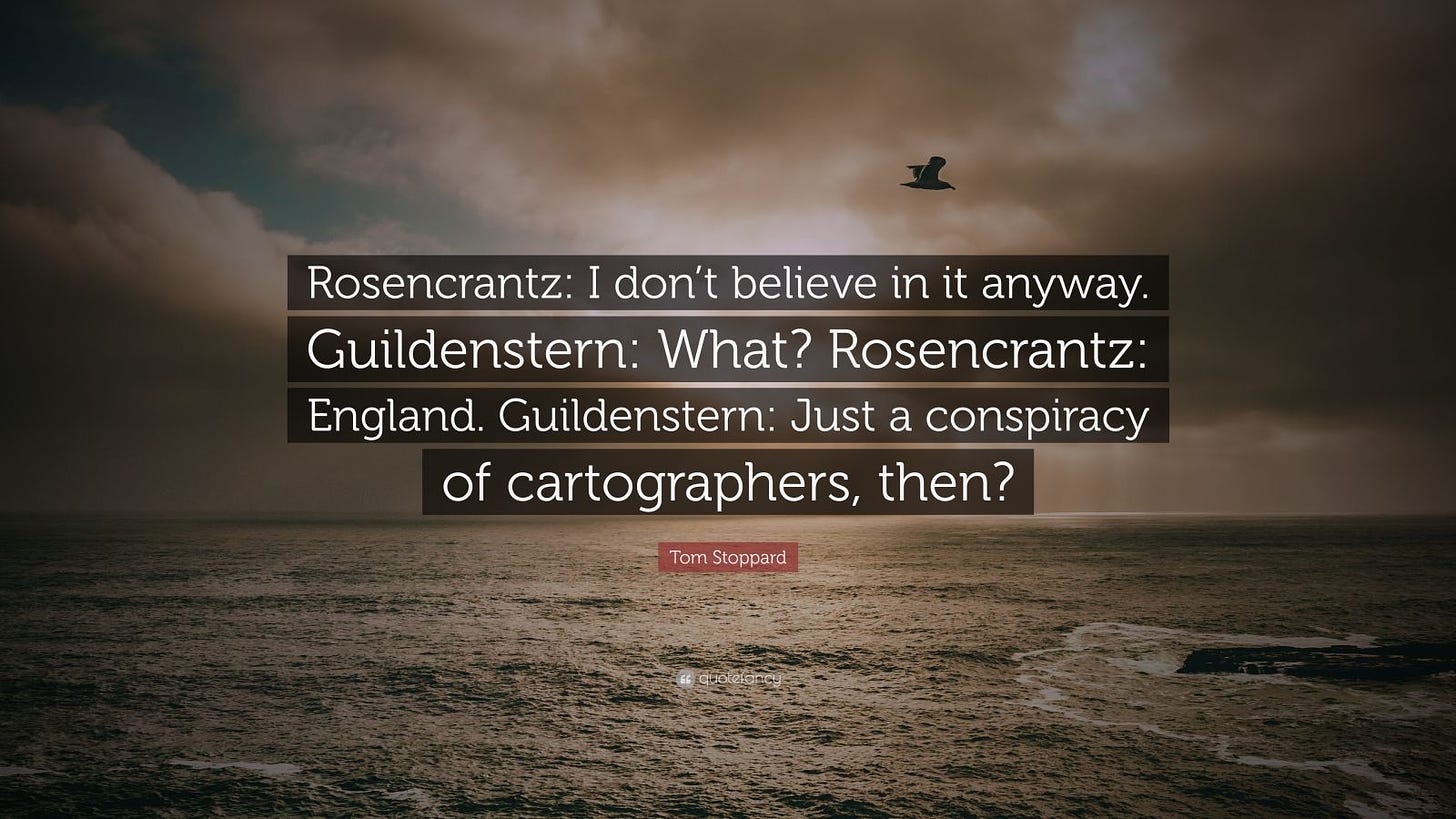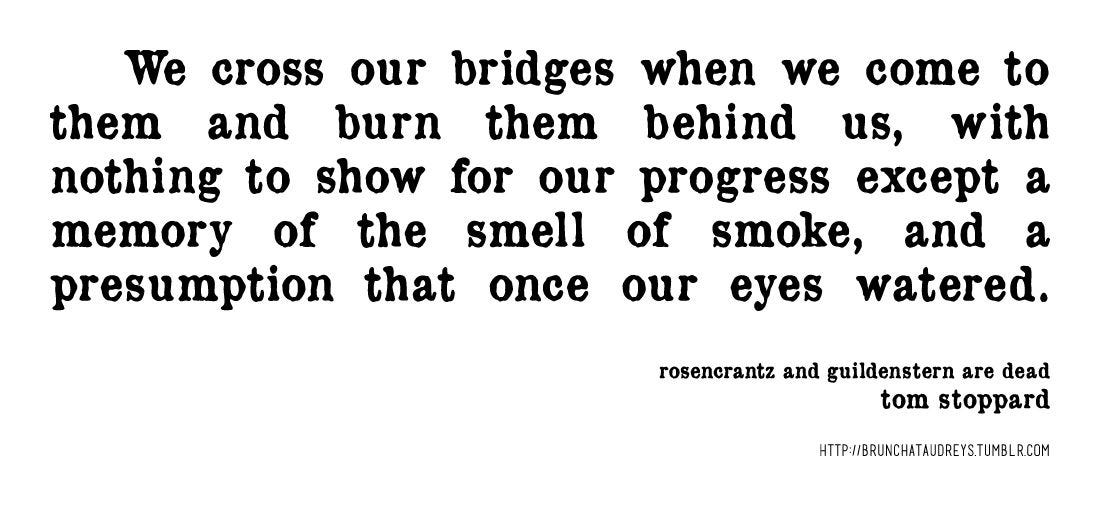the real dangers of the virtual life
becoming rosencrantz and guildenstern and losing our way
i recently came upon this tweet about the increasing prevalence of a sort of basic functional incomprehension and found it thought provoking. i think this idea can be extended and provide some useful insight into just how things get so out of control.
first off, take a read. pay particular attention to the part about a previously unknown sort of ignorance. there’s going to be a quiz.
leaving aside this baseless calumny against 10 year olds (as all the 10 year olds i knew could have given you chapter and verse on juptier and the milky way), this is a really interesting set of nested takes and it got me to thinking:
indeed, much of childhood as i recall it was experiential. it lay in picking things up, interacting with them, exploring, climbing, riding, falling. it was all a bit of a mess, but it was an interactive mess full of stuff to figure out, games to invent, daily proto-societies to build in the growth medium of unstructured play that allows each successive generation of young barbarians to civilize itself and earn a place in the larger civilization.
there was also a lot of reading, but it was real reading. classic books, classic themes, comings of age and findings of selves. histories, philosophies, science, math, drama.
these two vectors were synergistic: it was theory and application. you learned from books, and tested it experientially against the real and the demands of “figuring stuff out” and success and failure left you hungry for more theory, but you simply could not stray too far from “facts” as “the world” was always there to provide a check on it and the ever present rejection mode of “this is stupid. it doesn’t work like that!” or “i built it that way, but it fell down” was there to help you.
this is the great gift of the experiential: it keeps you grounded, keeps you from getting lost in false theory. one might go so far as to posit that it provides access to a higher form of knowing: that which has been validated against actual experience. it doesn’t always make you right, but it’s a deeper, more immersive engagement and understanding.
perhaps those are the only things that one can “truly know” and if this is so, it has profound implications for the seeming existential paucity of the modern age and of the apparent emergence of vast new vulnerabilities around collective hallucination and durable tendencies to “know what isn’t so.”
tangibility is the great checksum, the final acid test, the point of rubber meeting road and either gaining traction or spinning out. but what happens when we abandon it? what happens when we ask people, ask adults, ask children to have strong views about that which they have never seen, will never see, and perhaps could not see if they tried?
what happens as life becomes increasingly virtual and you’re asked to care and decide about far away things you’ve never encountered, places you’ve never been, and situations with which you have no experience as though they are the most important things in the world?
it’s a new kind of ignorance, a mistaking of that which you were told for that which you actually know or for that which you actually CAN know with any degree of visceral certainty.
it’s a replacement of the tangible with a model being used to validate a model.
in other words, it’s all fake; fugazi views on fugazi constructs.
there is nothing at the bottom save the presumption of ever more turtles down and down, world without end.
how can it be satisfying?
how can it be “true”?
perhaps more chilling, even if it were, how could you know?
there is a wonderful scene in tom stoppard’s classic “rosencrantz and guildenstern are dead” (made into a truly excellent movie) in which our befuddled protagonists puzzle through the idea of whether there is, indeed, such a thing as “england” or whether it might simply be “a conspiracy of cartographers.”
sure, it sounds absurd, but how, if you have never been, could you really know? how much of life is like this? more than most think, i’ll tell you that…
when i was an undergrad, the same 15 “protest majors” at brown excelled at getting media coverage for whatever the kerfuffle du jour was. you’d see it in media like the campus was erupting in activism. generally, it was the first any of us going to school there had heard of it. these were an endless string of concatenated nothing burgers that had zero to do with our lives. but, if you had no experience with it (as was the case with most newspaper readers) it could sure seem “real” or even “major.” how much of this are we falling for today?
i just had an old friend travel to san francisco and come back saying, yeah, it’s a little run down, but it’s nothing like as bad as the media is making out. mostly, it was fine.
i remember traveling (against the recommendations of many) to beruit in 2005 to be best man in a wedding. it was just after the hariri assassination. on the way in from the airport, we literally drove by the crater in the road where his car had been blown up. but the city itself was calm, safe, and we walked around happily having a great time. i loved the place. i wanted to buy a house there. (to my lasting regret, i got talked out of it)
sure, but would i go back now? well, it seems like maybe i shouldn’t because “dangerous” but is it? people said that last time too. the answer is “i have no idea.” i simply do not have a basis to have a strong view. maybe it’s terrifying. maybe it’s wonderful. but who can i trust to tell me? because that’s always the question, isn’t it? and this is how i think we’re going so wrong and why “globalism” is inherently always going to be built on supposition and lies. globalism inherently constitutes the demand to take strong views about that which you cannot know.
in this globalist age, we’re asked to care about all manner of far flung things that we cannot experience, cannot touch, cannot know in any tangible sense. this goes past fears that foreign places may be a mischief of misanthropic mapmakers misleading us; we’re being asked to believe in systemic racism, dangerous climate change, wars in ukraine, great resets, threatening pandemics, and collective actions while at the same time massacres in africa and concentration camps in china slide off the radar like stealth fighters, unbeknownst and unacknowledged. this vast virtual tapestry foregrounds and masks that which the tale tellers would have you see and miss, but can you trust any of it? and how could you know?
this is one of the deep and enduring epistemological questions: if you cannot experience it yourself, what would constitute a “truth standard” in even a basic solipsistic sense?
pictures, videos, news, media, government, scholarly reporting it’s always been slant and jingo prone, but the speed and reach of the modern info-tainment circuit is something altogether different and subject to unknowing ignorance in a manner that seems to be accelerating.
we’re encouraged to act like it is, but this is not our lives. this is all stuff happening “off stage” that we’re supposed to pretend we’re in the middle of. but we’re not. we have no idea if it’s thunder or corrugated sheeting being shaken.
this renders us rosencratnz and guildenstern, marginal characters on the edge of events, ill informed, manipulated, and ineffective.
belief in this and ordering one’s life around it is the very definition of being an NPC.
the problem with virtual worlds and virtual facts is that none can be made manifest in any tangible way and thus adulterated data becomes simultaneously the map and the terrain while selective reporting distorts perception and triggers ongoing associative cascades of confirmation and refutation bias that make it seem real. but these are, in reality, just a second layer of perception deception seeming to validate the underlying narratives.
they tell you “hottest year ever” and point to a pile of devised data purported to validate this from systems more error bar than measurement device and from this create a “consciousness” that then leads to confirmation bias. every time you feel hot or see a storm reported, yup, there it is, proof they’re right. it’s one big game of “don’t think of an elephant” being mistaken for actual baseline reality.
but the reality is that you could never feel a 0.2 degree rise in temps even if it were occurring. and the reality is that when data refutes this idea of “global boiling” it will be hidden and in the event that you happen to notice that, say, northern hemisphere snow cover is right about at all time max for this time of year (in 57 years since we have had modern measurement) you just ignore it or engage in some logical legerdemain about “well it must be warmer world making more snow!” people do not like holding contradictory beliefs, so they grab at what agrees, drop what does not, and get on with confirming their biases.
and this is REALLY easy when the issue you have a view on is virtual and cannot be experienced in a tangible sense and so too is the “information” about how that thing is going. it’s all lines on charts, models, ideologies, and tribal affiliation so that if you groupthink as we do, you’re accepted and feel cozy, like you got something right and have found a basis in “fact” but you haven’t. you’ve just pledged allegiance to a collective (and very possibly, a collective hallucination.)
we all do it. is this rutgers graph correct? i don’t know. it seems sound. maybe it is. but do you really want to bet your life or lifestyle on any chart drawn by strangers using a methodology with which you are only cursorily familiar (assuming you have any familiarity at all)?
the only way to know “for sure” is the tangible. we will always perceive it in a different way. and this is WHY effacing the tangible is so important to those who seek to foist their virtual offerings upon others and make them their realities. there was once an iconic tree in the maldives and rather than let it stand as testament to the island not sinking, climate scientists literally pulled it down to hide the evidence of their lack of evidence.
is this the world peg upon which you want to hang your hat?
the virtual fears the tangible above all else because the tangible may so easily supplant the intangible and this is why the stochastic terrorists of “information shaping” are so determined to eliminate tangibility from the experience of those they would sway by repetition and saturation.
how many monuments, history books, curriculums, and holidays has this happened to?
how much has been erased, defaced, or altered to prevent tangible truths from being spoken or seen?
reading history books from the 1920’s and 30’s is an astonishing practice. they are direct and incisive in a way “modern” books tend not to be, so proscribed and constipated have they become. you cannot “tell it like it is” because of “how that might affect some group” but what is this save an admission that they cannot handle the truth and that those telling the tales would rather lie to you and ground your perceptions in invalid virtual constructs rather than tangible truths.
this desire to proselytize to those who lack a basis to assess that which they are being told seems endemic.
why are the “gender activists” so set on going after pre-pubescents? because pre-pubescents are the ones who lack tangible experience with the adult aspects of gender, sexuality, and identity. they have not had the big jolts of hormones and change that come with adolescence and commence one’s experience and insight into such issues. so of course the prepubescent will believe fanciful tales about identity: they lack the tangible, experiential refutation they’d have had had this conversation occurred when they were 18 instead of 8.
why do the peddlers of “structural isms” tend to proselytize to the “privileged” instead of the purportedly downtrodden? probably because so few of those they would seek to mascot believe a word they say whereas “becky from vassar” eats this stuff up lock stock and hairshirt because it’s all virtual, not tangible. it’s things happening to other people in other places, not to her where it can be touched and felt.
solving a video game does not teach you about the world, it just teaches you the ingrained assumptions and models of the game designer. sure, “throw the guard dogs some meat and they will let you pass” makes sense in “zelda,” but as anyone who has tried this in an actual junkyard can tell you, reality ain’t like that. but the more we inhabit virtual worlds instead of real ones, the less able we are to discern that which is real from that which is not.
you’re applying a model to a simulation and getting back simulated results from which you presume to learn. it’s all filtered through media and bias and 12 layers of selection and curation and falsity until pretty soon you have a strong view about what should be done about the war in kerblackistan which winds up “validated” by later “reported outcomes” from “reputable sources.” but lost in all this is the fact that there is no such place, no real reality behind it; it’s just infinity tails wagging infinite dogs in something more akin to a febrile dreamscape than an actual world.
then we all wonder why everyone seems so bereft, bothered, and bewildered, why nothing has any sense of tangibility, and why deracination and hallucination have become the seeming state of man.
this is not because it’s some state of nature.
it’s because we’re trying to dine on a mirage of food.
the purported hallmark of the modern age is global cares, global concerns, and global action. but this is anti-human. it breaks everything that is human. this is why it always seems like globalists have it in for us: their whole ethos requires the subsumation of the tangible to the virtual, of that which you can touch and validate to some sort of ideal that you cannot. you must sacrifice that which is in front of you for the benefit of some amorphous collective you cannot truly know.
eats bugs so that the weather won’t change. how will you know if it worked? well, we’ll tell you. swearsies.
the fact of the matter is that these systems are too big for humans. their scale does not and cannot suit us. it’s all hearsay, all make believe. why does globalism so hate family and community and individualism? because these are things that CAN be felt, experienced, known. these are the things that become tangible and whose tangibility makes them stand out as better, finer, realer, and most of all truer things. they are, like dirt and rocks, hammers and trowels, things you can know rather than suspect, things you can inhabit with a different form of confidence and where so doing provides a different sort of pleasure and security.
rootless, raddled, and righteous makes for great shock troops, but a lousy life.
trusting that which you cannot see but failing to trust that which is right in front of you is a kind of madness. and this is what “globalism” has on offer and why it’s so vapid and harmful. in the end, imminence is all.
joy and meaning come from that which you experience directly. the answer is always “roll up your sleeves, get dirty, touch stuff, make things, explore, find, interact tangibly.” the real risk of the virtual world is that you inhabit nothing corporeal, just a vapor of ideas and a memory of smoke. (said the internet cat, basking in irony)
it is precisely what makes stoppard’s rosencrants and guildenstern such pitiable creatures: they have nothing to go on but words: no reality, no touchstone. it’s all spin and so they themselves are spinning. there is nothing of substance from which they may support or orient themselves.
that is no path to humanity.
and that is no life for a human.













Brilliant. This makes me want to pet a cat. Globalists care about everything, but nothing specific. I know many who live in the cities, ranting and raving about climate change and foreign conflicts while their own neighborhoods are deteriorating with drugs and homelessness. They get more mad at me for sending an article about crime than the crime itself.
Like an ostrich with its head buried in the sand, You cannot reason with a demoralized person: https://yuribezmenov.substack.com/p/how-to-reason-with-a-demoralized-person-yuri
In relation to a grounding in reality I recently wrote about Ryan Carson, the activist of justice who was murdered in Brooklyn at 4 am while out with his girlfriend. I analyzed the CCTV video of his murder to point out just how absurdly out of touch this man is. How he displayed a willful ignorance of the ways in which an angry person might hurt him, and how strange it is that a naive dough boy with no grasp of violence / danger is calling for the abolition of police.
https://theunhedgedcapitalist.substack.com/p/pillsbury-politics
The internet creates this tremendous disconnect between physical reality and how we interpret it. More pain will be caused until we find leaders who are more connected with the physical rather than virtue-signally world.